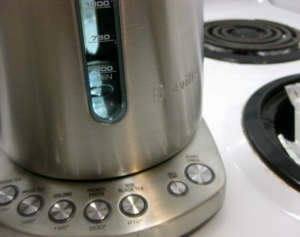Great Tips on How to Choose an Energy Efficient Kettle
Your kettle isn’t exactly a large appliance, so you wouldn’t think that it uses a huge amount of energy, right? It’s true on the surface, except that your kettle gets a LOT of use. On average, a UK household boils the kettle 1500 times per year. It’s not that difficult to believe if you consider that you might boil your kettle 4 times a day for coffee or tea and then perhaps another once or twice to cook food. All of that use adds up. According to Chris Goodall (cited by Ethical Consumer) your kettle can consume about 150kWh per yeah. This amounts to about 4% of your total electricity consumption.
Kinda scary, isn’t it?
One of the biggest problems is overfilling the kettle. If you’re only making one cup of tea or coffee, technically you need less than 500ml of water, but we tend to stick the kettle under the tap and just let rip, so we end up with enough water to make tea for a Sevens rugby team. Once again Ethical Consumer has a fun stat for us: Apparently if all the households in the UK boiled exactly the right amount of water they need for one day, the energy saved could light every street lamp in the country for one night.
Some kettle manufacturers have stepped up to stop the overfilling problem; for example, the ECO Kettle has 2 compartments so you can fill one with one cup of water to be boiled at a time. Some energy efficient kettles have lower water level indicators (minimum amounts to be boiled) so you can boil want you need, even if it is less than 500ml. And, because most elements are now under a plate, you don’t have to cover exposed elements with water you don’t need.
Another great feature that many kettle manufacturers are using is variable temperature control, so you can set the kettle to switch off when the water reaches a set temperature. For example, you can set your kettle to 70°C so that you can make the perfect cup of green tea.
More than energy efficiency?
 Energy efficiency is one thing, but what do you know about manufacturers’ stance on human rights, animal welfare and transparency in their supply chains? These days, with the global village being as small as it is, we’re more aware of the need to protect or at least stand up for people who live on the other side of the world. Ethical Consumer takes transparency and workers’ and animal rights very seriously and when it reviews appliances it considers things like:
Energy efficiency is one thing, but what do you know about manufacturers’ stance on human rights, animal welfare and transparency in their supply chains? These days, with the global village being as small as it is, we’re more aware of the need to protect or at least stand up for people who live on the other side of the world. Ethical Consumer takes transparency and workers’ and animal rights very seriously and when it reviews appliances it considers things like:
- Supply chain policies: Are workers treated fairly, are they adequately remunerated, are working conditions safe? Supply chains that have components in China are usually problematic.
- Environmental reporting: Transparency in environmental reporting is important, which means honesty when it comes to things like carbon emissions, water use and land use.
- Company profile: Includes consumer boycotts for things like animal testing and financing drilling operations or fracking.
Choose an ethical and energy efficient kettle
Ethical Consumer uses a rating system out of 20 to determine which are the most ethical and energy efficient kettles. The list is interactive, so you can select the criteria that are most important to you and get truly relevant results. If all criteria are selected as important, the top kettles include:
- Bodum Clara glass hob kettle (14)
- Bodum electric kettle (14)
- Dualit electric kettles (14)
- ECO Kettle electric kettles (14)
- Judge hob kettle (14)
- Krups electric kettles (14)
- La Cafetiere electric and hob kettles (14)
- La Cafetiere hob kettles (14)
- Magimax electric kettle (14)
- Masteclass hob kettles (14)
- Moulinex electric kettles (14)
- Rowenta electric kettles (14)
- Stellar electric and hob kettles (14)
- Tefal electric and Quick Cup kettles (14)
- Breville electric kettles (13)
- Morphy Richards electric and hob kettles (9)
- Prestige electric and hob kettles (8)
- Braun electric kettles (7.5)
- De’Longhi electric kettles (7)
- Kenwood electric kettles (7)
The internet has made it super easy to be an ethical consumer, so why not take advantage of Google and hold large companies accountable for their business and manufacturing practices – and enjoy a cool kettle with all the energy and money savings that go with it.
